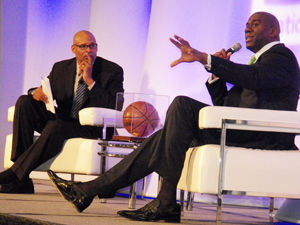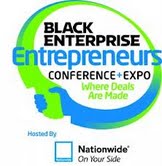NBA Hall of Famer and entrepreneur, "Magic" Johnson shares path to business success
By Starla Muhammad -Staff Writer- | Last updated: May 30, 2013 - 12:05:06 AMWhat's your opinion on this article?

Earvin “Magic” Johnson (right) answers questions posed by Clark Kellogg at the Black Enterprise Conference and Expo held recently in Columbus, Ohio. Photo: Starla Muhammad
|
His wise investments and partnerships have elevated him toward all-star status in another arena. Just as noteworthy, is Mr. Johnson’s track record of opening businesses in predominately Black neighborhoods, providing jobs in the community.
As a youth, his goal was to play professional basketball, but it was not his sole focus, Mr. Johnson told a gathering of Black business owners and entrepreneurs, at the Black Enterprise Conference and Expo held recently in Columbus, Ohio.
Former college and NBA player, current collegiate basketball TV analyst Clark Kellogg conducted a one-on-one “fireside” chat with the basketball legend on the first day of the conference, in which Mr. Johnson talked about his start in business and shared keys for success.
“Even as a young man who was thinking about playing in the NBA, I was still dreaming about being a businessman because I’m a big believer if you can’t dream it, you can’t become it. So, when I got my first job at 16, it was 7 floors that I had to clean, you know, an office building,” he told the audience.

|
“I would get to that seventh floor and I would bust in like I was Earl Graves, Sr., you know like I was the CEO,” said Mr. Johnson flashing his trademark smile. Earl Graves, Sr., is the renowned founder and publisher of Black Enterprise magazine, longtime businessman and philanthropist.
Mr. Johnson credited two Black businesses men, Greg Eaton and Joel Ferguson in his hometown of Lansing, Mich., as examples of Blacks owning buildings, car dealerships and other businesses. They were his childhood examples of what could be accomplished, he explained. It is important that Blacks mentor and help one another in business, he added.
Mr. Johnson, CEO of Magic Johnson Enterprises is part-owner of the LA Dodgers major league baseball team and has several enterprises including Magic Workforce Solutions, Sodexo Magic Food Service, Magic Airport Holdings, ASPiRE and other entities.
He began fact-finding, researching and reaching out to people early in his playing career to set the stage for the growth and development of his own business portfolio.
It’s important to gather information, factfind and develop a solid business strategy, said Mr. Johnson.
“Your strategy is everything. How are you going to drive ROI (Return On Investment), how are you going to implement your plan, execute it and then who’s going to manage that?, he asked, giving audience members something to think about.
“A lot of people looked at me as a dumb jock. I could play basketball but I couldn’t run a business,” he said.
Mr. Johnson said he was repeatedly turned down by investors and potential business partners that did not share his vision or think that he was business savvy. And the fact he wanted to invest in the so-called ghettos and ‘hoods around the country was a vision, few shared.
“We have to get into … proving people wrong. Everybody told me I couldn’t do it in urban America. They said there was no money to be made in urban America,” explained Mr. Johnson.
“I wanted to impact Urban America. I wanted to show people. Here we are, African Americans about a trillion dollars spending power. Latinos about a trillion dollars spending power. That’s a lot of disposable income. We love to shop; we love to do things but the problem is, a lot of retail is not in our community. We’ve got to drive outside of our communities and spend our money,” he said.
Mr. Johnson said knowing demand for products, goods and services was present in the inner cities prompted him to open Magic Johnson Theaters in 1994 in South Central L.A., in a joint venture with Sony Pictures Entertainment. Through the years, he has formed business partnerships with Starbuck’s, T.G.I. Friday’s and 24 Hour Fitness
And it has certainly paid off as Mr. Johnson’s net worth, estimated to be $700 million makes him one of the country’s wealthiest Black Americans.
Forming strategic partnerships is important stressed Mr. Johnson.
“A lot of times we want it all for ourselves, we want 100 percent. And that becomes a problem,” he continued.
“Look, if I can get 50 percent of something, I’m good. That check is still good. So you get somebody that don’t have the expertise that you have and then you guys come together and you build something very powerful and build a successful business.”
Different knowledge bases and skill sets are part of the formula for his success, he continued.
“I know what I know and hopefully my partner knows something else and then we come together and make a lot of money and then we put people in our community to work. And that’s what I did to build my business,” said Mr. Johnson.
The same work ethic displayed on the basketball court is what he brings to the board room he shared.
“If you’re going to be in business, you better be a competitor. A competitor will do their homework, research, bring their passion and fire, will be disciplined. You know it’s really important to stay focused on the prize,” he said.
Mr. Johnson shared how he disregarded naysayers and could not wait to prove them wrong and told the crowd they must do the same.
He also said hiring the right personnel is critical.
“The number one failure of minority-owned business is either finance number one, number two, you done hired the wrong people and most of the time it’s your family. I paid mine to stay away!” he laughed.
Another key Mr. Johnson told participants to make sure they wrote down is that it is important in a business to exceed expectations. When the opportunity is there, “you’ve got to over deliver,” but don’t take on more than you can manage, he cautioned.
Building a track record of success and brand building are also important he said, adding, “Your brand, your reputation is everything.”
Commenting on the grim fact that Blacks, Latinos and other minorities have been unable to pass down wealth to future generations, Mr. Johnson said parents must teach their children early about business, citing Mr. Graves Sr. as an example. His son Earl “Butch” Graves, Jr. is now President and CEO of Black Enterprise after being prepared by his father.
Mr. Johnson said he is doing the same with his oldest son, Andre.
Although he is now a multimillionaire, Mr. Johnson told the crowd he has not forgotten his roots, growing up poor in Lansing. The youngest of 9 children, Mr. Johnson’s mother and father worked hard to provide for their children.
Giving back is something Mr. Johnson said is important. His Magic Johnson Foundation formed not long after he made his 1992 announcement that he was HIV positive, awards student scholarships, hosts job and health fairs, HIV/AIDS education and a host of other community services.
“God blessed us to be able to do what we do and then somebody helped us along the way to achieve what we are achieving at that time. Those two African American men helped me to become what I am today. That’s why I’m standing here talking to everybody,” said Mr. Johnson.
“So it’s my job to reach back and to give back, too. And so I really believe that you can do good and do well at the same time; That you can give back and still be successful at the same time. We should always be about giving back while we’re trying to also build our own success.”
INSIDE STORIES AND REVIEWS
-
-
About Harriett ... and the Negro Hollywood Road Show
By Rabiah Muhammad, Guest Columnist » Full Story -
Skepticism greets Jay-Z, NFL talk of inspiring change
By Bryan 18X Crawford and Richard B. Muhammad The Final Call Newspaper @TheFinalCall » Full Story -
The painful problem of Black girls and suicide
By Charlene Muhammad -National Correspondent- » Full Story -
Exploitation of Innocence - Report: Perceptions, policies hurting Black girls
By Charlene Muhammad -National Correspondent- » Full Story -
Big Ballin: Big ideas fuel a father’s Big Baller Brand and brash business sense
By Bryan Crawford -Contributing Writer- » Full Story






 Click Here Stay Connected!
Click Here Stay Connected!








